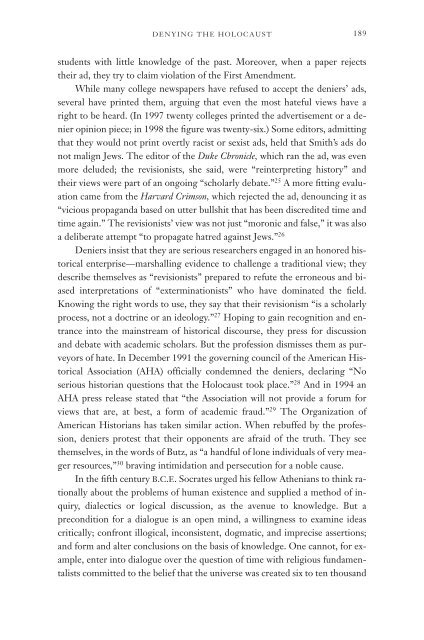41845358-Antisemitism
41845358-Antisemitism
41845358-Antisemitism
Create successful ePaper yourself
Turn your PDF publications into a flip-book with our unique Google optimized e-Paper software.
DENYING THE HOLOCAUST<br />
189<br />
students with little knowledge of the past. Moreover, when a paper rejects<br />
their ad, they try to claim violation of the First Amendment.<br />
While many college newspapers have refused to accept the deniers’ ads,<br />
several have printed them, arguing that even the most hateful views have a<br />
right to be heard. (In 1997 twenty colleges printed the advertisement or a denier<br />
opinion piece; in 1998 the figure was twenty-six.) Some editors, admitting<br />
that they would not print overtly racist or sexist ads, held that Smith’s ads do<br />
not malign Jews. The editor of the Duke Chronicle, which ran the ad, was even<br />
more deluded; the revisionists, she said, were “reinterpreting history” and<br />
their views were part of an ongoing “scholarly debate.” 25 A more fitting evaluation<br />
came from the Harvard Crimson, which rejected the ad, denouncing it as<br />
“vicious propaganda based on utter bullshit that has been discredited time and<br />
time again.” The revisionists’ view was not just “moronic and false,” it was also<br />
a deliberate attempt “to propagate hatred against Jews.” 26<br />
Deniers insist that they are serious researchers engaged in an honored historical<br />
enterprise—marshalling evidence to challenge a traditional view; they<br />
describe themselves as “revisionists” prepared to refute the erroneous and biased<br />
interpretations of “exterminationists” who have dominated the field.<br />
Knowing the right words to use, they say that their revisionism “is a scholarly<br />
process, not a doctrine or an ideology.” 27 Hoping to gain recognition and entrance<br />
into the mainstream of historical discourse, they press for discussion<br />
and debate with academic scholars. But the profession dismisses them as purveyors<br />
of hate. In December 1991 the governing council of the American Historical<br />
Association (AHA) officially condemned the deniers, declaring “No<br />
serious historian questions that the Holocaust took place.” 28 And in 1994 an<br />
AHA press release stated that “the Association will not provide a forum for<br />
views that are, at best, a form of academic fraud.” 29 The Organization of<br />
American Historians has taken similar action. When rebuffed by the profession,<br />
deniers protest that their opponents are afraid of the truth. They see<br />
themselves, in the words of Butz, as “a handful of lone individuals of very meager<br />
resources,” 30 braving intimidation and persecution for a noble cause.<br />
In the fifth century B.C.E. Socrates urged his fellow Athenians to think rationally<br />
about the problems of human existence and supplied a method of inquiry,<br />
dialectics or logical discussion, as the avenue to knowledge. But a<br />
precondition for a dialogue is an open mind, a willingness to examine ideas<br />
critically; confront illogical, inconsistent, dogmatic, and imprecise assertions;<br />
and form and alter conclusions on the basis of knowledge. One cannot, for example,<br />
enter into dialogue over the question of time with religious fundamentalists<br />
committed to the belief that the universe was created six to ten thousand


